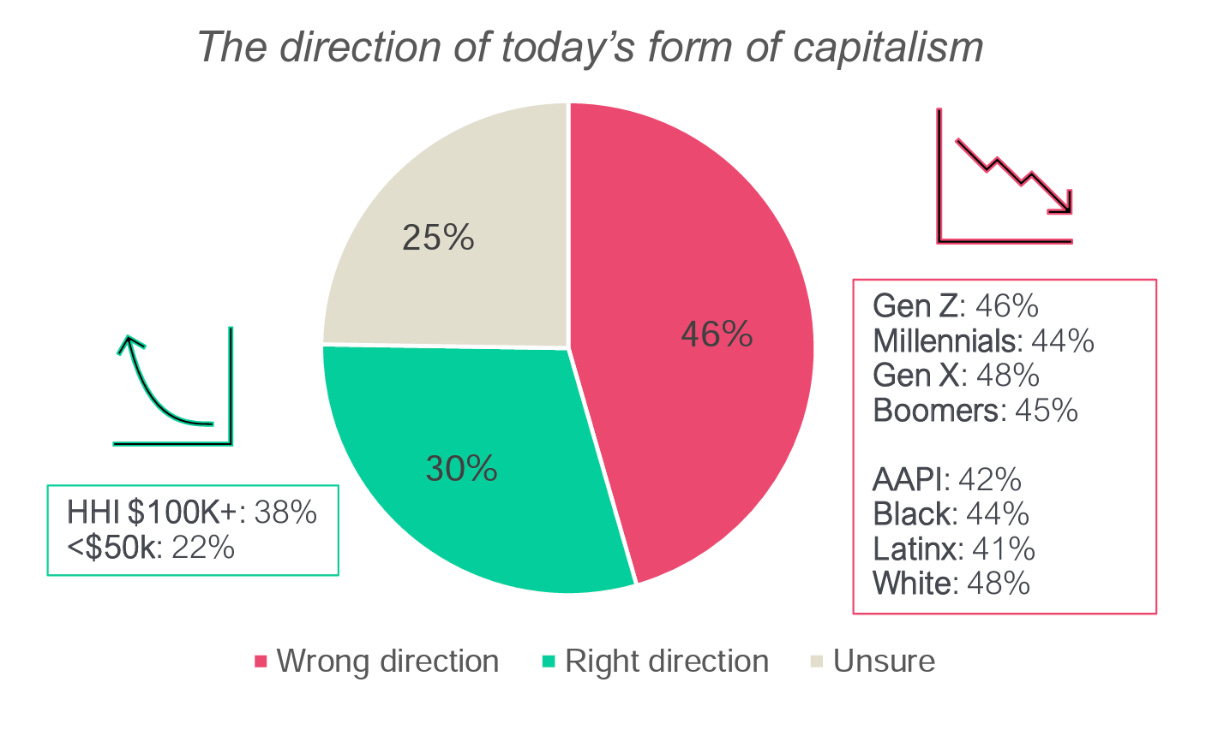Eat The Rich? Americans Say Capitalism Is On The Wrong Track
Dark sentiments around capitalism prevail, so what can we do about it?
The Next Big Think! will send you one number, one meaty insight, and three links weekly to keep you ahead of societal shifts.
#FinancialVibes
66% of Americans believe “wealth inequality is a serious national issue.”
This sentiment increases for Gen Z (78%), Millennials, AAPI (81%), Black (77%), and LGBTQIA+ (76%) Americans. Wealth inequality, dark capitalism, and class warfare become top of mind, with Americans questioning how to establish long-term financial security in a system they feel is ‘rigged against them.’ Today, 64% of Americans live paycheck to paycheck, and 44% have picked up extra work to offset inflation. Why does this matter? We’ve found in our research consistently that financial security is the linchpin to being able to achieve mental and physical health. If we want a healthy American culture, we must start with financial security.
Source: Harris’s Americans & Billionaires Survey, Lending Tree
Eat The Rich? Americans Say Capitalism Is On The Wrong Track
What:
You can’t miss the dark capitalist trends bubbling up in culture, on the streets, and on TikTok. Hollywood reflects it to us with Succession, Squid Games, The Menu, and Triangle of Sadness. In New York, you can see the subways tagged with Jean-Jacques Rousseau’s ‘Eat the rich,’ the French Revolution sentiment tied to being able to afford basic human rights. And I’m almost positive you couldn’t get through the TikTok algorithm without some questioning about the system we find ourselves in (the pros and cons).
We wanted to understand how deep this crack in capitalism runs, so in partnership with Forbes and the brilliant Seth Matlin, Managing Director, Forbes CMO Network, we present Capitalism’s Crisis Of Perception (Forbes article) and State of American Capitalism (report).
I know what you might be thinking, capitalism is almost a sacred word in America; any question of it is often removed from conversations, presentations, and hushed about. But capitalism is just a system, a construct, and these systems aren’t static, they are in motion. The data clearly shows it is a system Americans believe needs to be changed; 76% of Americans “believe that today’s form of capitalism needs to evolve”- this agreement cuts across generational, racial, and political ideologies.
What the data tells us:
First, we wanted to understand what people believe they need from a thriving society before asking them about their perceptions of capitalism, as the term itself can swing sentiment. You can find the full report here.
For Americans, a thriving society means access to foundation needs like affordable healthcare, housing, and childcare. But also the ability to innovate in an open market.
So then, when you ask them what capitalism delivers you find that…
Capitalism gains high marks on the ability to accumulate wealth, but is seen as less likely to deliver on the foundation needs associated with a thriving society
Overall, Americans think capitalism needs a course correction …
62% of Americans believe capitalism isn't working for younger generations as it did for older ones (68% of Millennials, 67% of Gen X, 67% of parents with kids under 18 )
Nearly half of Americans believe capitalism is on the wrong track
7 in 10 Americans say…
Capitalism is “A system that has gone awry that had good intentions, but bad actors.”
“While capitalism isn’t perfect, it is still the best option”.
However, younger Americans are less likely to agree (Gen Z: 57% v. Boomer: 80%)
When asked what economic frameworks deliver against a thriving societi’s needs this is where Gen Z/ Millennial Americans are more open to alternatives
Young Americans give the edge to socialism to deliver societies’ foundational needs
Younger Americans are also more likely to say they are willing to pay higher taxes to fund more social services; Gen Z: 56%, Millennials: 65% v. Gen X: 48%, Boomers: 40%
And Forbes showcased the data around young people willing to make the trade to socialism (we asked about communism too, but that scored in the low 20s).
What to think about:
Above: MSCHF ‘eat the rich’ ice cream truck, eat your favorite tech billionaire in NYC.
Capitalism is not a static economic model. Instead, it adapts and evolves with the times. And while it isn’t perfect, we see in the data that Americans still believe it creates a pathway for open innovation, big dreams, and opportunities unmatched by other economies (as vibesestvida highlights in his experience between the UK and US).
The question is can we do better? A society ripped apart by growing financial inequities is not going to be a stable one.
What can you do~
Over 8 in 10 Americans (84%) believe that corporations have a role in evolving capitalism today. Below are some tips.
Watch ‘growth’ talk:
Nearly 7 in 10 Americans (68%) believe that a focus on growth over everything isn't sustainable in a world with finite resources and growing climate crises.
Tip: Don’t talk about growth to your customer base. We see this sometimes with young companies that are so excited to grow quickly, and they talk to consumers almost as investors. Don’t do this it could work against you.
Help right the ship:
As capitalism evolves, majorities of Americans are looking to access livable wages (62%), affordable housing (58%), universal healthcare (54%), and people’s well-being prioritized over profits and money (52%)
A number of Americans are also looking to universal senior care (48%, Boomers+: 59%) and universal childcare (42%, parents <18: 46%)
Tip: Become a more responsive leader that helps fill the gaps and/or guides policy to enact better policies that support the health of Americans.
Expect regulation:
62% of Americans would support regulation that would restrict some of America's free market capabilities in favor of incorporating more inclusive measures to benefit more people
Tip: Is there a way to get ahead of it? Either start building inclusive measures into new business models or be part of the regulation (proactive vs. reactive mode).
3 Links
CEO Pay Packages Fell Sharply in 2022, the First Decline in a Decade (WSJ)
Should we automate the CEO? A Software Company Is Testing It Out (The Hustle)
Connecticut’s $600 Million Plan to Narrow Wealth Gap: Give Kids Trust Funds (Bloomberg)
Bonus: Check out our recent work with First Tee.
Curiosity is contagious; if you like this newsletter, please share it!!
Penned by Libby Rodney and Abbey Lunney, founders of the Thought Leadership Group at The Harris Poll. To learn more about the Thought Leadership Practice, just contact one of us or find out more here.












